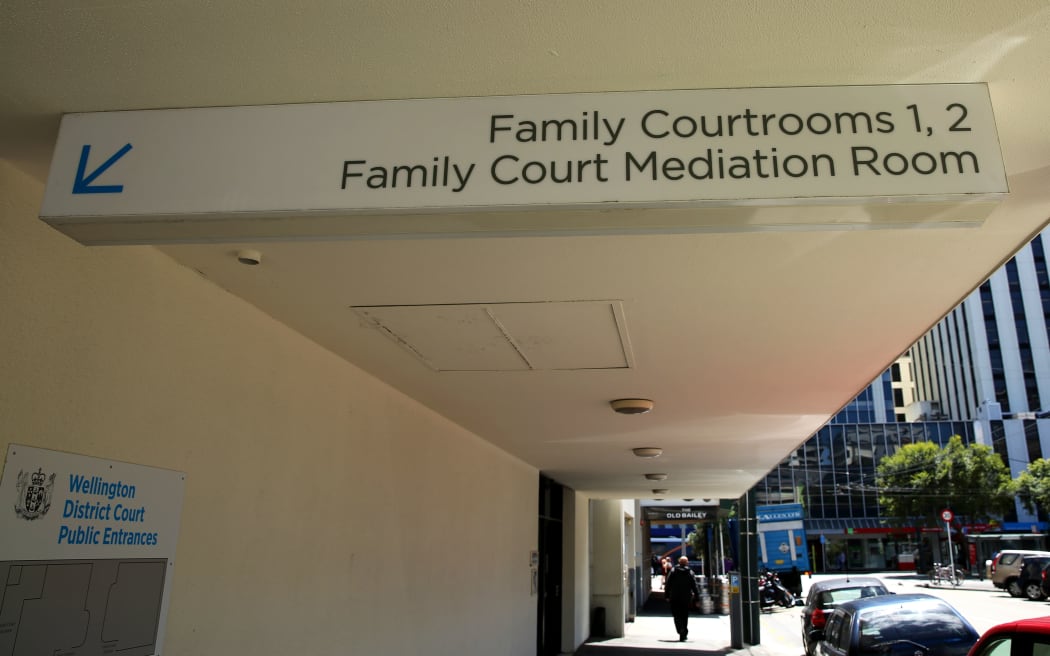The proportion of Family Court cases going through on an urgent basis on behalf of just one parent is "very, very high," and lawyers are blaming a push towards mediation.

Wellington Family Court. Photo: RNZ / Alexander Robertson
Last year 75 percent of the 7253 parenting applications and 64 percent of 1443 guardianship applications were made without notice and ex parte, which means they were filed by one parent or caregiver.
It comes after changes to the court system in 2014 made it harder for couples to get a hearing without first attending mediation.
Otago University's dean of law, Mark Henaghan said because of that, many people were making urgent applications ex parte, or as a sole parent, so as to meet the criteria for getting the case before a judge.
"The difficulty with ex parte is that it's only one side of the case is put at the start. Normally ex parte should be in the exceptional case, not every case."
The number of such cases was extraordinarily high, he said.
"Now, getting it up to 75 percent, is well beyond what you would expect for ex parte applications in any system of law.
"Some cases obviously are urgent and it's important that they are signified that way, but this is getting [to be] a very, very high figure and it does distort the whole process," he said.
Under the 2014 law change the Family Dispute Resolution Service was introduced to try to keep cases out of court by allowing couples to go to mediation.
For those on low incomes, the service is free, but otherwise parents have to pay about $450 each.
Last year, 1618 couples completed mediation, but almost the same number - 1503 - were exempted from attending and went straight to court.
Professor Henaghan said under the present system, people could either go to mediation, represent themselves in court or, if the case is made without notice, have a lawyer represent them in court.
He said research showed people did not like representing themselves and when relationships broke up, they wanted a lawyer.
"Your whole life is at risk when your relationship breaks up and when there's children involved it just adds to the risk.
"It's a bit like climbing up a very steep mountain with no mountain guide, you would feel very nervous and anxious.
"I think they see lawyers as mountain guides who know how the system works, know what should be done and what can be done to put them in the best possible position," he said.
Justice Minister Amy Adams said mediation was working for those who had gone through it.
She agreed the ex parte figures were high, but put the blame on lawyers.

Justice Minister Amy Adams Photo: RNZ
"What it tells you is that lawyers are acting quite differently post the reforms ... and that is something that is of concern to us and obviously something that we are looking into," she said.
"I think that is a big part of the behaviour.
"I don't think ... circumstances of parties changed that clearly and to that extent - in a way that exactly timed with the reforms that limited the involvement of lawyers," she said.
However, Law Society family law chair Michelle Duggan said to make a without-notice application lawyers had to show their client or the children faced some risk or undue hardship if the case wasn't brought before the court and could face consequences if it could not be justified.
Ms Duggan - who is herself a mediator - said many people were reluctant to use the mediation service because it took too long, was expensive and in some cases asked the impossible.
"You sometimes don't have two reasonable people, looking for a mutually satisfactory solution. You often have one parent, or sometimes even two parents, who will never agree, they won't even agree about the colour of the sky," she said.
Ms Duggan said Ministry of Justice officials were ignoring the problems of the new system and potential solutions.
Those solutions could involve making the mediation process more accessible - both in terms of time and money - and allowing courts to consider applications quickly without having to file a without-notice application, she said.
Ms Adams said she was awaiting a report from officials on the impact of the changes to the Family Court, which was due back by the end of the year.



